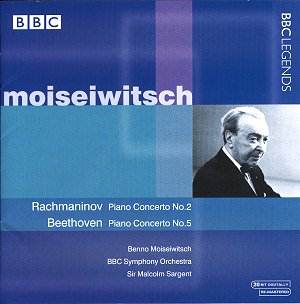In Benno Moiseiwitsch, at last one encounters a pianist
for whom phenomenal technique is subservient to his equally phenomenal
musicality. It is a combination we can but dream about today, and each
passing competition, or each new face presented by whichever record
company seems to deny the continued existence of such a precious beast.
It is indeed a treat for the record collector that this BBC disc comes
onto the market at about the same time as Solomon’s studio account of
the ‘Emperor’ (with the Philharmonia Orchestra under Herbert Menges
on Testament SBT1221 and recorded in May 1955). Both pianists' accounts
breathe the same integrity, albeit presented with their own personalities.
The explosive opening chords of the ‘Emperor’ set the
tone of the interpretation: the dry timpani strokes only serve to emphasise
this force. There may, indeed, be some blemishes in the ensuing piano
cadenzas (and when they recur later in the movement), but the actual
piano sound is fabulously rich and full. Indeed, Moiseiwitsch is unafraid
to take risks, and as his vision of the whole is so well projected,
such small stumbles hardly matter. Along with these risks comes an astonishingly
wide dynamic range, heard in microcosm in the final chordal sequence
accompanied by timpani towards the close of the final movement, which
moves from almost-martellato fortissimo down to a near inaudible pppp.
The slow movement is beautifully sung, although Moiseiwitsch can admittedly
over-project at times.
Moiseiwitsch enjoyed a special relationship with Sergei
Rachmaninov, and his affection and enthusiasm for that composer’s music
makes his performances memorable. More, the Proms were close to his
heart (he made over a hundred appearances at the annual festival). The
two combine to give a performance of great sweep and force. The opening
chords of the first movement of the Second Concerto are incredibly dramatic,
leading to the ensuing theme on strings, which comes across like an
unstoppable flow of lava. Balancing the drama of the first movement,
the second shows Moiseiwitsch’s sensitivity to subtle harmonic change.
Moiseiwitsch imbues the inner part-writing of the final movements with
a life and character all of their own. More, he has the long-range vision
to stop the approach to the end appearing like a sprint to the finishing
line. Instead, it appears as the logical, and powerful, outcome of all
of the events that have preceded it.
This is a memorable coupling which acts as a reminder
of Moiseiwitsch’s greatness. If only there were pianists like this today.
Colin Clarke
